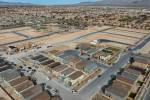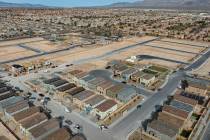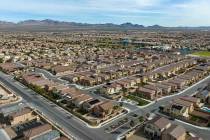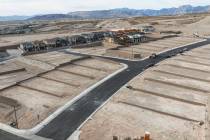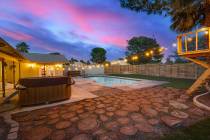Hot seller’s market shifts into reverse

Locals who have tired of real estate’s roller-coaster ride will have to hang on a little longer: Southern Nevada is at least several months away from stabilized home prices and sales, two analysts said at a housing-industry outlook Thursday.
Homeowners can expect a sustained slide in property values at least into early 2008, and perhaps into 2009, the 500 or so attendees at SalesTraq’s Crystal Ball seminar learned.
Larry Murphy, president of real estate research firm SalesTraq, said the current market is a reversal of the heady days of early 2004, when buyers lined up by the hundreds outside planned subdivisions to snap up the first few homes in each release.
Sellers who put existing homes on the market had numerous offers within hours, including bids well beyond their asking price.
Today, it’s much easier to buy a home, and much tougher to sell one.
Several builders, including Lennar Corp., Pulte Homes, Astoria Homes and Beazer Homes, have slashed prices on standing inventory.
Builders have offered October price breaks of as much as 20 percent, with up to $250,000 in markdowns on a single home.
New-home sales in September skidded 52 percent, while prices dipped 3.3 percent. Builders have a standing inventory of 2,500 to 3,000 homes.
Nor has the market’s downturn spared existing homes.
September’s median price sagged 8.9 percent when compared with September 2006, and sales tumbled 49.9 percent in the same period. Yet, inventory has swamped the market, jumping tenfold since spring 2004 to September’s supply of 27,417 properties. That inventory means local real estate values will have depreciated 5 percent to 10 percent by the end of 2007, Murphy predicted.
So, when will the market come back to life?
Give it 12 months to 18 months, Murphy said.
Based on September’s inventories and sales rates, Southern Nevada has about a 19-month supply of existing homes and a three-month supply of new homes.
The market will have hit bottom when supplies stop rising and prices stop declining, Murphy said.
Before that happens, expect the median price of a resale home to drop from $263,075 in September to around $240,000 or $250,000.
On the other side of that nadir, though, is another bounce in housing sales and prices, Murphy predicted, as a $33 billion building binge in the city’s resort sector comes online and generates thousands of new jobs.
Murphy said he expects the next market surge to start in the second half of 2009 or the first half of 2010, after the $1.8 billion Palazzo, the $2.2 billion Wynn Encore and the $7.4 billion CityCenter have opened.
"Trust me, there is another real estate boom coming," Murphy said.
Another local real estate watcher said he expects the Las Vegas housing market to bottom out much sooner than Murphy anticipates, with a new market peak to come on the other side of today’s rough times.
Steve Bottfeld, an analyst with research firm Marketing Solutions, said he sees signs that the housing downturn has evened out. The market could leave the doldrums as soon as the first or second quarter of 2008, Bottfeld said.
Foreclosures fell 8 percent nationwide in September after reaching a 32-month high in August, according to data from California consultant RealtyTrac.
In Las Vegas, the foreclosure rate dropped from one for every 165 households, or 6,197 foreclosures, in August to one for every 185 households, or 5,504 filings, in September.
Countrywide Home Loans’ announcement this week that it would put $16 billion toward refinancing adjustable-rate mortgages scheduled to reset to higher interest rates will present a "strong hold against foreclosures," Bottfeld said.
Plus, the inventory of existing homes, though historically high at more than 27,000 listings, is stable and hasn’t increased significantly this fall, Bottfeld said.
He noted that today’s softening numbers of closings and prices represent a snapshot of the market as it was 60 days to 120 days ago. September’s data includes sales made before the Federal Reserve added $5 billion in cash to the economy and cut by half a percent the rate banks use to determine the mortgage interest they’ll charge.
Statistics from coming months and quarters should reflect the resulting boost in available credit.
What’s more, an unstable stock market could benefit housing, because uncertainty in financial markets has traditionally pushed investors to trade in paper wealth for the more-tangible asset of real estate, Bottfeld said.
A limited local supply of privately owned land will also push prices upward in the long term, as will construction of megaresorts along the Strip. The first of those new resorts, the Las Vegas Sands Corp.’s Palazzo, is scheduled to open in December.
"A boom in hotel rooms will precede a boom in real estate," Bottfeld said. "We’re treading on the bottom of the market now."
Other crystal ball observations:
• Nevada is tied with Hawaii at No. 2 for the share of its residents’ income that goes toward housing. Nevada homeowners spend an average of 46 percent of their wages on housing payments. California is No. 1, with an average of 52 percent of every paycheck going toward mortgages, Bottfeld said.
• The housing slump is generating lean times for sales associates.
The average sales rate per new-home subdivision in 2006 was five houses per month; today, that average is about two houses a month. With a standard two sales people per subdivision sharing the two sales and earning a commission of 1 percent, that means some agents can no longer afford the homes they’re selling, Murphy said.
• Affordable pricing hasn’t inoculated builders and sellers from a down market. Sales volume was down 53 percent in the third quarter among homes priced below $200,000, Murphy said.
By contrast, the number of sales among homes priced at more than $1 million was up 368 percent in the quarter, and some Realtors who specialize in luxury sales are having banner years, he said.
Contact reporter Jennifer Robison at jrobison@reviewjournal.com or (702) 380-4512.
Housing in Las VegasMore Information





